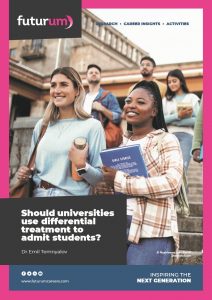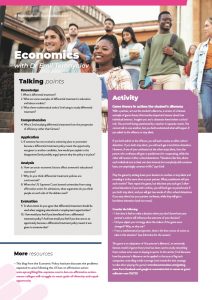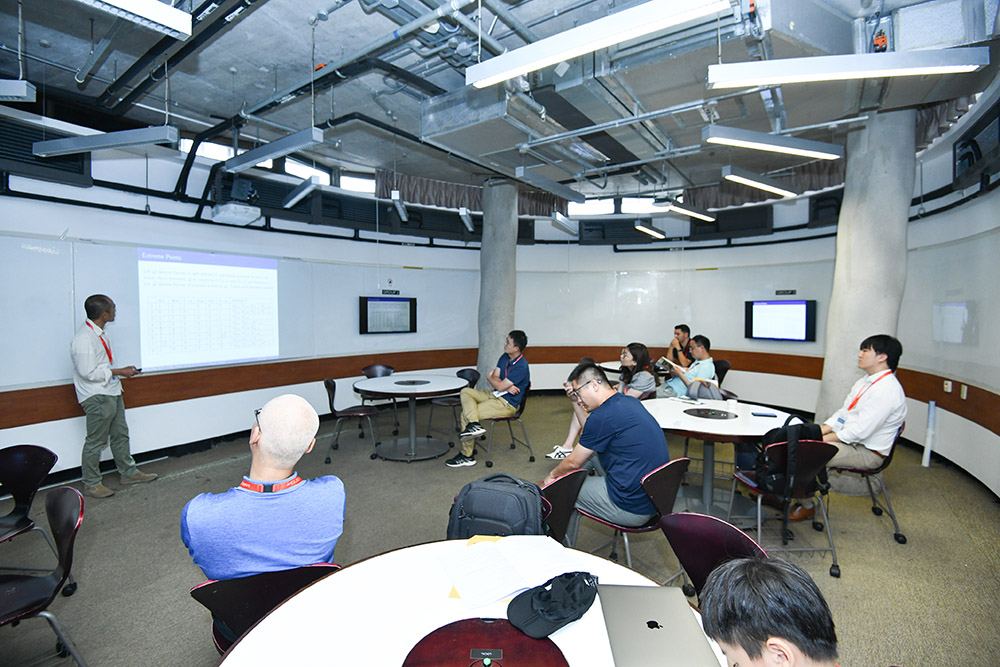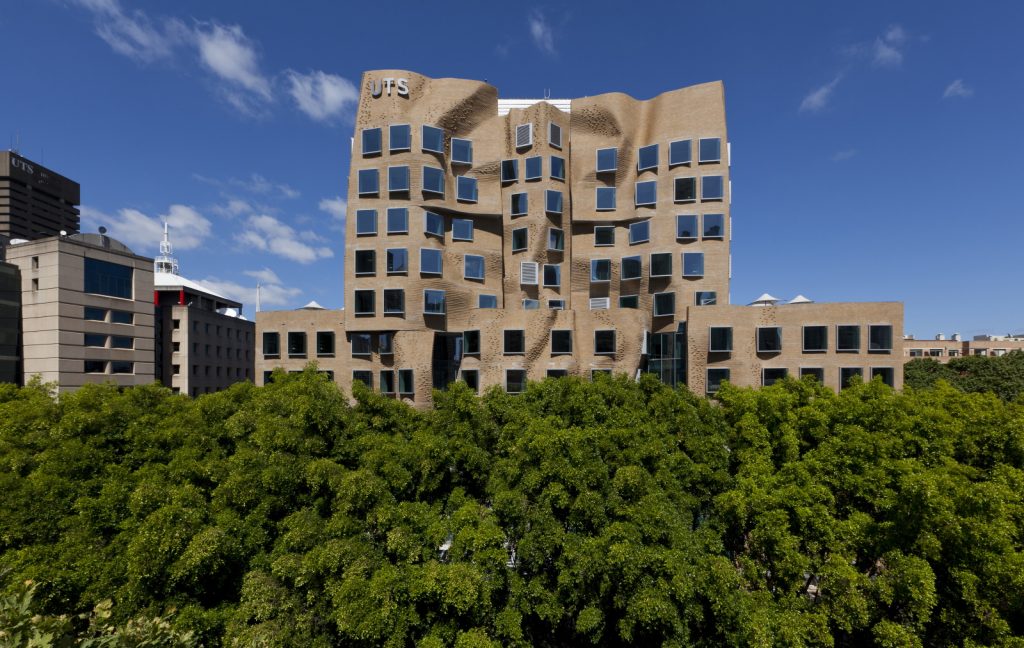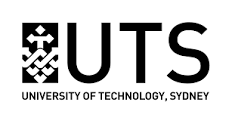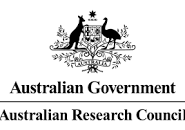Should universities use differential treatment to admit students?
At first glance, a student’s exam scores might seem like an uncomplicated way to measure academic ability. However, Dr Emil Temnyalov, an economist at the University of Technology Sydney in Australia, highlights the effects of socio-economic influences on these scores. The idea that exam results should be assessed differently based on a student’s socio-economic background is known as differential treatment, and Emil is investigating whether such policies can improve equality and efficiency in education and labour markets.
Talk like an economist
Differential treatment — treating people differently based on their characteristics to help them overcome disadvantages. Examples of differential treatment policies include positive discrimination and affirmative action, both of which involve favouring individuals belonging to groups considered to be disadvantaged
Game theory — the branch of mathematics that examines strategic interactions in competitive situations, where people’s choices dramatically affect one another
Public policy — government actions or guidelines
Socio-economic status — a term used to describe the combination of social and economic characteristics of a person, such as their household income, family circumstances, level of education or occupation
What do you think of when you hear the word ‘economics’? Stock markets, unemployment, inflation and recession? While these are the areas of economics commonly in the news, the field is so much broader than this. “Economics is the study of how people make decisions, how we choose where to study and work, how we promote fairness in society and how our lives are shaped by market institutions and government policies,” says Dr Emil Temnyalov, an economist at the University of Technology Sydney.
Differential treatment is an example of how economic theories can shape public policies and individual’s opportunities. Differential treatment refers to economic and social policies (such as positive discrimination and affirmative action) whereby individuals are treated differently based on personal characteristics. For example, under differential treatment policies, a university offering places to students would not only look at students’ exam results, but also consider whether they have been disadvantaged by factors such as their household income or where they live. An employer looking to hire or promote an employee would not only look at their performance at work, but also consider whether that performance had been affected by factors such as parental leave.
Why is differential treatment important?
Consider the following scenario: two students are applying for the same place at university. The first student has an extremely high grade point average (GPA) from their school exams, while the second student’s GPA is still good, but not as high. At first glance, the first student seems the obvious choice for admitting to the university. However, upon closer inspection, the university admissions team can see that the second candidate worked part-time after school to financially support themself, so had less time to dedicate to their studies, and they lived in a poorer neighbourhood and attended a lower-achieving school. On the other hand, the first candidate did not need a job so could spend time on schoolwork. They grew up in an affluent neighbourhood with wealthy parents who could afford to send them to a top-class school and pay for one-to-one tutoring to help them prepare for their exams.
In light of these socio-economic factors, the university admissions team might decide to consider an extra advantage for the second candidate in addition to their good GPA, as they managed to do well academically despite the hurdles they had to navigate alongside their schooling. “If a student is clearly disadvantaged in preparing for their university admission exams, should we then interpret their score in the same way as that of a student who is advantaged?” asks Emil.
Is differential treatment fair?
When people think of differential treatment, they tend to think about it in the context of fairness. Is it fair that we let someone with lower school grades take a university place instead of someone with higher grades? Is it fair to judge a student from a low-achieving school against a privately-tutored student? In employment contexts, is it fair to promote an employee who has missed a year of work because they had a baby, over an employee who has been working continuously for many years? As you can imagine, there are many arguments both for and against these ideas. Using different admission and promotion criteria for different students and employees to combat the disadvantages individuals may face is controversial.
In 2023, the US Supreme Court banned universities from using affirmative action policies to support students who may be disadvantaged by their race, causing heated discussions from both sides of the debate. In contrast, the Australian government has embraced policies to tackle socio-economic disadvantages, and many Australian universities actively favour students applying from high schools with fewer resources. In 2019, the University of Technology Sydney, where Emil works, made headlines when it adjusted the entry requirements for women candidates applying to engineering degrees, in the hope of encouraging more women to study engineering, a field where they are historically under-represented.
Reference
https://doi.org/10.33424/FUTURUM429
© UTS Business School
© Professor John Turner
Emil attends a conference session at the Asia Meeting of the Econometric Society, held in Singapore in July 2023
© Asia Meeting of the Econometric Society
When Emil began his research, he found that most public policy debates on differential treatment focused on the idea of fairness. “However, there is generally no consensus in our society regarding what ‘fairness’ means in the context of socio-economic issues,” he explains. Therefore, instead of using fairness as a reference point, Emil decided to study differential treatment from the perspective of efficiency.
What is efficiency?
If we return to our scenario with the two university applicants, looking at the situation from an efficiency point of view would mean choosing the candidate who will most benefit from the university place. Regardless of whether differential treatment is considered fair, the efficiency rationale gives researchers and policymakers another way to look at how and why public policies should consider socio-economic factors.
How does Emil study the efficiency of differential treatment?
Emil is using mathematical tools to develop models of education and labour markets, which allow him to definitively state how efficiency can be maximised to improve education and labour market policies. His first tool is game theory, which examines how people make choices in strategic interactions, specifically how we make decisions when other people’s decisions affect our outcomes. In the context of university admissions, when a student decides to apply to a university, their choice affects the outcomes of any other students applying to the same university place, as a limited number of candidates can be admitted. Emil’s second tool is mechanism design, an economic theory that examines how institutions can distribute resources in a way that achieves a desirable goal. “For example, how can universities allocate their places in a way that achieves efficiency?” asks Emil. Thirdly, he uses information economics, which investigates the informational content of a signal. “For example, what does a university admission score (the signal) mean in terms of a student’s potential benefit from a university education?” he asks.
What has Emil discovered?
By combining these three mathematical tools, Emil found that, regardless of opinions about the fairness of differential treatment, it is generally necessary to include differential treatment in policies that aim to maximise efficiency. “If a university wants to admit the candidates who would most benefit from receiving an education, they cannot just reject everyone below a certain cut-off exam score,” he explains. “Instead, the university needs to factor in the socio-economic characteristics that may influence a student’s scores and customise admission policies for students from disadvantaged backgrounds.” This means that efficient admission policies will typically have different admission cut-offs for students with different characteristics.
What other policies can reduce inequality in education and labour markets?
In addition to examining the effects of differential treatment, Emil has also been exploring other policies that could reduce inequality in education and labour markets. He advises that changing the structure of an organisation (such as a school district or a business), either to ‘flatten’ the structure or to make it ‘top-heavy’, will help to reduce inequality. In the context of a school district, a flatter organisational structure would separate schools into fewer tiers, while a top-heavy structure would provide more student places at top-tier schools. In a business context, a company with a flatter structure would have fewer levels of employment, while a top-heavy company would have more top-level positions available.
With these insights from his research, Emil hopes that future policymakers will design public policies that not only use differential treatment to improve access to education and promotion opportunities, but that also restructure school districts and businesses in ways that reduce inequality in education and labour markets.
 Dr Emil Temnyalov
Dr Emil Temnyalov
Economics Department, Business School, University of Technology Sydney, Australia
Field of research: Economics
Research project: Investigating whether differential treatment policies improve equality and efficiency in education and labour markets
Funder: Australian Research Council (ARC)
This work is supported by the ARC’s Discovery Early Career Researcher Award, under award number DE200100590. The contents are solely the responsibility of the authors and do not necessarily represent the official views of the ARC.
About economics
What do economists study?
Economics is the field concerned with the production, consumption and transfer of wealth and goods around the world. But what does that actually mean? “Economists study many issues that significantly affect people’s everyday lives, such as where we can study, what jobs we can get, what we pay for various products that we buy as consumers, and how we access healthcare,” says Emil.
This means economics is about much more than just stocks and investments. It deals with social and public policy issues and is relevant to a huge number of different fields. “Economists study a very wide range of topics, from individual decision-making, to how firms and businesses make strategic decisions, to how markets are regulated and how public policies are designed by governments,” Emil adds.
How does economics combine mathematics and social science?
People working in economics use a fascinating combination of both technical and soft skills to solve problems. “On one hand, we build mathematical models, we conduct statistical analyses, and we run computer simulations,” says Emil. “On the other, we need good communication skills to write policy papers or communicate with stakeholders in government and in industry, and we also need a lot of creativity to develop novel approaches to solve problems.”
“Economic theories allow us to draw very precise conclusions and insights, and to study problems in a formal and accurate way,” continues Emil. Rather than explaining economic problems and theories in words, which can lead to vague and confusing conclusions, economists describe economic and social phenomena with mathematical models, representing the problem in a precise and specific language. “This means that we can debate issues and compare different possible solutions with a more rigorous approach,” he explains. “In education and labour markets, there are major social issues and public policy problems, so I think it’s important to develop clear insights into these using a precise methodology.”
Pathway from school to economics
• If your school offers classes in economics, take these to learn about the basics of the field. Otherwise, mathematics, statistics and computer science classes will teach you the technical skills economists need, such as mathematical modelling, data analysis and developing computer simulations.
• “The best way to get started is to take an economics class and see whether you like it,” says Emil. “This will give you a good understanding of the kinds of topics and questions that economists study and care about.”
• Many universities offer degrees in economics. Degrees in mathematics, data science or public policy could also lead to a career in economics.
• “Attend university open days and information events to get a better understanding of what it’s like to study economics, including the chance to sit in on a sample economics class,” says Emil.
Explore careers in economics
• Working in economics could mean working in industry, government or academia. “In industry, economists are often employed by consulting companies, financial institutions and businesses which need data analytics,” says Emil. Government work might involve working in central banks or treasury departments, overseeing different markets or evaluating infrastructure and public spending projects. “Universities hire academic economists as lecturers and researchers, because there is a lot of demand for their expertise from students who want to study economics.”
• Discover Economics (www.discovereconomics.co.uk), a campaign to increase diversity among economics students, has a wealth of information about careers in economics, as well as blogs, podcasts and interviews with people working and studying in the field.
• “There are plenty of blogs and YouTube channels that introduce economics and apply economics to interesting issues in creative ways,” says Emil. “Personally, I find game theory to be one of the most fascinating introductions to economics.” This video provides a crash course on game theory: www.youtube.com/watch?v=PCcVODWm-oY
Meet Emil
What were your interests when you were younger?
During my school years, I was always very interested in computers, video games and foreign languages. In fact, I mostly learnt English from playing video games!
What inspired you to study economics?
Growing up in Bulgaria, I didn’t have any exposure to economics in school, because it’s not part of the high school curriculum. I first studied economics when I went to the US for university. I found it a fascinating field, which inspired me to study it further in graduate school and to embark on an academic career in economics.
What are your proudest career achievements?
Obtaining a PhD in economics is one of my proudest achievements. A PhD is a very serious and long-term commitment. During this long period of time, you focus quite narrowly on the topics you study, which requires a lot of personal motivation, dedication and self-discipline.
After becoming a university lecturer in Australia, I won a prestigious award from the Australian Research Council (ARC) that is only given to a handful of economists each year. I’m proud of the fact that my research project on equity and efficiency in education and labour markets was deemed worthwhile and awarded funding by the ARC.
What is your favourite fact about economics?
Economics can be applied to virtually anything that involves individual decision-making or public policy! This includes many things that at first glance don’t seem to have much to do with economics. For example, during the COVID-19 pandemic, many economists re-focused their efforts towards coming up with ways to mitigate the impact of the pandemic, such as designing better lockdown policies, encouraging people to get vaccinated and improving the incentives for people to act in ways that helped society more broadly. Economics equips you with a very versatile set of skills and allows you to tackle problems creatively across a wide range of issues, far beyond stock markets, unemployment and inflation.
What do you enjoy doing in your free time?
I still love learning foreign languages, and I enjoy reading non-fiction books and watching movies. I also love playing board games, where I can put my game theory skills to the test!
Emil’s top tips
1. If you are interested in economics, it is important to focus on both your technical and soft skills.
2. Don’t be scared of math! In real life, math is a lot more fun than it may seem in school. I think it’s exciting that math can be applied to study individual and social issues through the lens of economics. Game theory is a good example of a mathematical field that is great fun.
3. Remember that it’s never too late to try something new. For example, I didn’t study much math at school, and only really explored it when I went to university.
Do you have a question for Emil?
Write it in the comments box below and Emil will get back to you. (Remember, researchers are very busy people, so you may have to wait a few days.)

